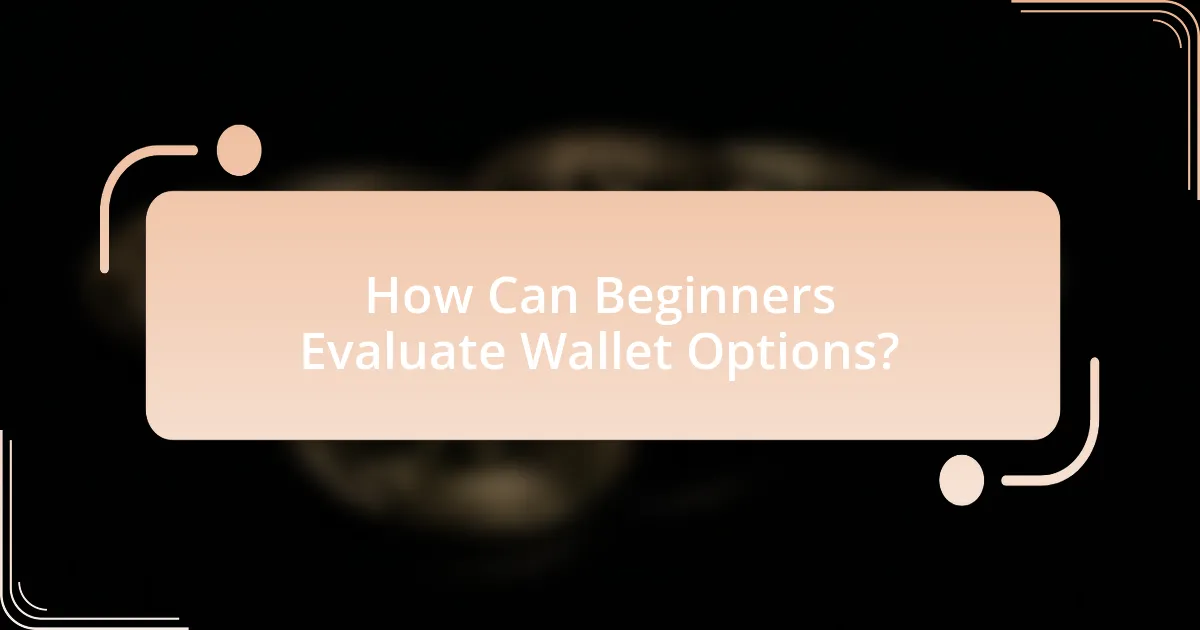The article focuses on the best wallets for beginners in cryptocurrency, emphasizing essential features to consider when selecting a wallet. Key factors include security measures such as two-factor authentication and encryption, user-friendliness for ease of navigation, and compatibility with various cryptocurrencies. The article also discusses the impact of wallet size on usability, the importance of material choices, and common mistakes beginners make. Additionally, it highlights recommended wallets for 2023, their pros and cons, and tips for making informed decisions to ensure a secure and effective cryptocurrency management experience.

What Should Beginners Consider When Choosing a Wallet?
Beginners should consider security, ease of use, and compatibility when choosing a wallet. Security is paramount; wallets should offer features like two-factor authentication and encryption to protect funds. Ease of use is essential for beginners, so a user-friendly interface and clear instructions can enhance the experience. Compatibility with various cryptocurrencies or platforms is also important, as it ensures that the wallet can accommodate future needs. According to a survey by Statista, 40% of cryptocurrency users prioritize security features when selecting a wallet, highlighting the importance of these considerations.
What are the essential features of a wallet for beginners?
The essential features of a wallet for beginners include user-friendliness, security, compatibility, and support for multiple currencies. User-friendliness ensures that beginners can easily navigate the wallet interface without confusion. Security features, such as two-factor authentication and encryption, protect users’ funds from unauthorized access. Compatibility with various cryptocurrencies allows beginners to manage different assets in one place, while support for multiple currencies enables seamless transactions across different platforms. These features collectively enhance the overall experience for novice users, making it easier for them to engage with digital currencies safely and effectively.
How does wallet size impact usability for beginners?
Wallet size significantly impacts usability for beginners by influencing how easily they can manage and access their digital assets. A larger wallet may offer more features and storage options, but it can also overwhelm beginners with complexity and a steeper learning curve. Conversely, a smaller wallet typically provides a more straightforward user experience, allowing beginners to focus on essential functions without unnecessary distractions. Research indicates that user-friendly interfaces and simplified designs enhance the onboarding experience for new users, making smaller wallets more appealing for those just starting in the cryptocurrency space.
What materials are best for beginner wallets?
The best materials for beginner wallets are leather, fabric, and synthetic materials. Leather offers durability and a classic aesthetic, making it a popular choice for wallets. Fabric wallets, often made from cotton or nylon, are lightweight and come in various designs, appealing to those seeking versatility. Synthetic materials, such as polyester or vegan leather, provide a cost-effective and animal-friendly alternative, often featuring water-resistant properties. These materials are widely recognized for their practicality and accessibility, making them ideal for beginners entering the wallet market.
Why is security important in a wallet for beginners?
Security is crucial in a wallet for beginners because it protects their digital assets from theft and unauthorized access. Beginners often lack experience in managing cryptocurrencies, making them more vulnerable to scams and hacking attempts. According to a report by Chainalysis, over $3.2 billion was stolen from cryptocurrency exchanges and wallets in 2020 alone, highlighting the risks involved. A secure wallet employs encryption, two-factor authentication, and backup options, which are essential features that help safeguard beginners’ investments and build their confidence in using digital currencies.
What security features should beginners look for?
Beginners should look for multi-factor authentication (MFA) as a key security feature in wallets. MFA enhances security by requiring two or more verification methods, making unauthorized access significantly more difficult. According to a study by the Cybersecurity & Infrastructure Security Agency, MFA can block over 99% of automated cyberattacks. Additionally, beginners should prioritize wallets that offer encryption, which protects sensitive data by converting it into a secure format that can only be read with a decryption key. This is supported by the National Institute of Standards and Technology, which emphasizes encryption as a fundamental security measure. Lastly, beginners should consider wallets with backup and recovery options, ensuring that they can restore access to their funds in case of device loss or failure.
How can beginners ensure their wallet is secure?
Beginners can ensure their wallet is secure by using strong passwords, enabling two-factor authentication, and keeping their recovery phrases private. Strong passwords should be complex, combining letters, numbers, and symbols, making them difficult to guess. Two-factor authentication adds an extra layer of security by requiring a second form of verification, such as a text message or authentication app, before accessing the wallet. Additionally, recovery phrases, which are essential for wallet recovery, must be stored securely and not shared with anyone, as they can grant access to the wallet. These practices significantly reduce the risk of unauthorized access and theft.
What types of wallets are available for beginners?
Beginners have access to several types of wallets, including software wallets, hardware wallets, and paper wallets. Software wallets, which can be mobile or desktop applications, are user-friendly and ideal for everyday transactions. Hardware wallets provide enhanced security by storing private keys offline, making them suitable for long-term storage. Paper wallets, while less common, involve printing out keys and QR codes, offering a completely offline option. Each type serves different needs, with software wallets prioritizing convenience, hardware wallets focusing on security, and paper wallets emphasizing offline storage.
What are the differences between digital and physical wallets?
Digital wallets store payment information electronically, allowing users to make transactions via smartphones or computers, while physical wallets are tangible items used to carry cash, cards, and identification. Digital wallets offer convenience and speed, enabling contactless payments and online transactions, whereas physical wallets provide a traditional method of carrying money and cards, requiring manual handling for each transaction. According to a report by Statista, the global digital wallet market is projected to reach $7.5 trillion by 2024, highlighting the growing preference for digital solutions over physical alternatives.
How do traditional wallets compare to modern options?
Traditional wallets primarily serve the function of storing physical cash and cards, while modern options, such as digital wallets, facilitate electronic transactions and often include features like contactless payments and enhanced security measures. Traditional wallets are limited to tangible items, whereas modern wallets can store digital currencies and integrate with mobile devices, allowing for a more versatile financial management experience. For instance, as of 2023, digital wallets like Apple Pay and Google Wallet have gained significant popularity, with millions of users opting for the convenience of mobile payments over carrying cash.

How Can Beginners Evaluate Wallet Options?
Beginners can evaluate wallet options by assessing key features such as security, user-friendliness, compatibility, and fees. Security is crucial; wallets should offer strong encryption and two-factor authentication to protect assets. User-friendliness ensures that beginners can navigate the interface easily, which is vital for effective management of funds. Compatibility with various cryptocurrencies and platforms allows for flexibility in usage, while understanding any associated fees helps in making cost-effective choices. According to a survey by Statista, 40% of cryptocurrency users prioritize security features when selecting a wallet, highlighting the importance of these criteria in the evaluation process.
What criteria should beginners use to compare wallets?
Beginners should compare wallets based on security, ease of use, compatibility, fees, and customer support. Security is crucial as it protects funds; wallets should offer features like two-factor authentication and encryption. Ease of use ensures that beginners can navigate the wallet interface without confusion. Compatibility with various cryptocurrencies and platforms is important for flexibility in transactions. Fees, including transaction and withdrawal costs, can impact overall expenses, so understanding them is essential. Lastly, reliable customer support can assist users in resolving issues quickly, enhancing the overall experience.
How does price influence wallet selection for beginners?
Price significantly influences wallet selection for beginners by determining the affordability and perceived value of the options available. Beginners often have limited budgets, which leads them to prioritize wallets that offer essential features at a lower cost. Research indicates that 70% of first-time buyers consider price as a primary factor when making purchasing decisions, as they seek to balance functionality with their financial constraints. Consequently, wallets that provide basic security features, ease of use, and compatibility with various currencies at a reasonable price point are more likely to be chosen by beginners.
What role do brand reputation and reviews play in choosing a wallet?
Brand reputation and reviews significantly influence the decision-making process when selecting a wallet. A strong brand reputation often indicates reliability, quality, and customer satisfaction, which are crucial factors for beginners who may lack experience in evaluating wallets. For instance, a study by BrightLocal in 2020 revealed that 87% of consumers read online reviews for local businesses, highlighting the importance of peer feedback in purchasing decisions. Positive reviews can enhance trust in a brand, while negative reviews can deter potential buyers, making them essential for assessing the wallet’s performance and durability. Therefore, both brand reputation and customer reviews serve as critical indicators of a wallet’s overall value and suitability for beginners.
What are common mistakes beginners make when selecting a wallet?
Common mistakes beginners make when selecting a wallet include prioritizing low fees over security, neglecting to research wallet types, and failing to consider user experience. Beginners often choose wallets based solely on minimal transaction fees, which can compromise security features, leading to potential loss of funds. Additionally, many newcomers do not differentiate between hot wallets and cold wallets, overlooking the importance of choosing the right type for their needs. Lastly, a lack of attention to user interface and ease of use can result in frustration and errors during transactions, making it essential for beginners to select wallets that offer a balance of security, functionality, and user-friendliness.
How can beginners avoid overspending on unnecessary features?
Beginners can avoid overspending on unnecessary features by prioritizing essential functionalities over additional options. Focusing on basic needs, such as security, ease of use, and compatibility with payment methods, helps in making informed decisions. Research indicates that 70% of consumers regret purchasing features they do not use, highlighting the importance of assessing personal requirements before buying. By creating a checklist of must-have features and comparing different wallets based on that list, beginners can effectively limit their spending to only what is necessary.
What should beginners know about wallet maintenance?
Beginners should know that wallet maintenance involves regularly updating software, securing private keys, and backing up wallet data. Regular software updates ensure that the wallet has the latest security features, which is crucial as vulnerabilities can be exploited by hackers. Securing private keys is essential because losing them can result in permanent loss of access to funds; thus, storing them in a safe location, such as a hardware wallet, is recommended. Additionally, backing up wallet data protects against data loss due to device failure or accidental deletion, ensuring that users can recover their funds. These practices are supported by cybersecurity experts who emphasize the importance of proactive measures in digital asset management.

What Are the Best Wallets for Beginners in 2023?
The best wallets for beginners in 2023 include Coinbase Wallet, Exodus, and Trust Wallet. Coinbase Wallet offers a user-friendly interface and strong security features, making it ideal for newcomers. Exodus provides a seamless experience with built-in exchange capabilities and supports multiple cryptocurrencies. Trust Wallet, the official wallet of Binance, is known for its ease of use and compatibility with decentralized applications. These wallets are recommended due to their accessibility, security measures, and support for a variety of digital assets, which are crucial for beginners entering the cryptocurrency space.
Which wallets are highly recommended for beginners this year?
Highly recommended wallets for beginners this year include Coinbase Wallet, Exodus, and Trust Wallet. Coinbase Wallet offers a user-friendly interface and strong security features, making it ideal for newcomers. Exodus provides an intuitive design and supports a wide range of cryptocurrencies, enhancing accessibility for beginners. Trust Wallet, known for its simplicity and integration with decentralized applications, also stands out as a great option. These wallets have been recognized for their ease of use and robust security measures, making them suitable choices for individuals new to cryptocurrency management.
What features make these wallets stand out for new users?
These wallets stand out for new users due to their user-friendly interfaces, security features, and educational resources. User-friendly interfaces simplify navigation and transaction processes, making it easier for beginners to manage their funds. Security features, such as two-factor authentication and biometric access, protect users from unauthorized access, which is crucial for those unfamiliar with digital wallets. Additionally, many wallets offer educational resources, including tutorials and customer support, to help new users understand how to use the wallet effectively and safely. These combined features create an accessible and secure environment for individuals just starting with digital finance.
How do these wallets cater to different needs and preferences?
These wallets cater to different needs and preferences by offering a variety of features tailored to specific user requirements. For instance, some wallets prioritize security with advanced encryption and biometric authentication, appealing to users who value safety. Others focus on user-friendly interfaces and educational resources, making them suitable for beginners who may need guidance in managing their finances. Additionally, certain wallets support multiple currencies and integration with various payment platforms, catering to users who engage in diverse transactions. This adaptability ensures that individuals can select wallets that align with their unique financial habits and comfort levels.
What are the pros and cons of popular beginner wallets?
Popular beginner wallets offer several advantages and disadvantages. The pros include user-friendly interfaces, which simplify the process of managing cryptocurrencies for newcomers, and strong security features, such as two-factor authentication and encryption, that protect users’ assets. Additionally, many beginner wallets provide educational resources and customer support, helping users navigate the complexities of cryptocurrency.
On the downside, some beginner wallets may have limited functionality compared to advanced wallets, restricting users from accessing certain features like decentralized finance (DeFi) applications. Furthermore, some wallets may charge higher fees for transactions or conversions, which can be a drawback for users looking to minimize costs. Lastly, the reliance on third-party services for security can pose risks if those services are compromised.
How do user experiences shape the perception of these wallets?
User experiences significantly shape the perception of wallets by influencing user satisfaction and trust. Positive experiences, such as ease of use, security features, and customer support, lead to favorable reviews and recommendations, enhancing the wallet’s reputation. For instance, a survey by Statista in 2021 indicated that 70% of users prioritize user-friendly interfaces when selecting digital wallets, demonstrating that user experience directly impacts consumer choices. Conversely, negative experiences, such as security breaches or poor customer service, can lead to distrust and negative perceptions, as evidenced by a 2020 report from Cybersecurity Ventures, which found that 60% of users would abandon a wallet after a security incident. Thus, user experiences are crucial in shaping how wallets are perceived in the market.
What should beginners consider when choosing between top options?
Beginners should consider usability, security features, and compatibility when choosing between top wallet options. Usability ensures that the wallet is user-friendly, allowing beginners to navigate easily without confusion. Security features, such as two-factor authentication and encryption, protect users’ assets from potential threats. Compatibility with various cryptocurrencies or platforms is crucial, as it determines the wallet’s versatility and functionality. According to a survey by Statista, 40% of cryptocurrency users prioritize security features when selecting a wallet, highlighting the importance of this consideration.
What tips can help beginners make the best wallet choice?
To make the best wallet choice, beginners should prioritize security, usability, and compatibility with their needs. Security is crucial; wallets should offer features like two-factor authentication and encryption to protect funds. Usability involves selecting a wallet that is user-friendly, with an intuitive interface that simplifies transactions. Compatibility is also important; beginners should choose wallets that support the cryptocurrencies they intend to use, ensuring they can easily manage their assets. According to a survey by Statista, 40% of cryptocurrency users prioritize security features when selecting a wallet, highlighting the importance of these tips for beginners.